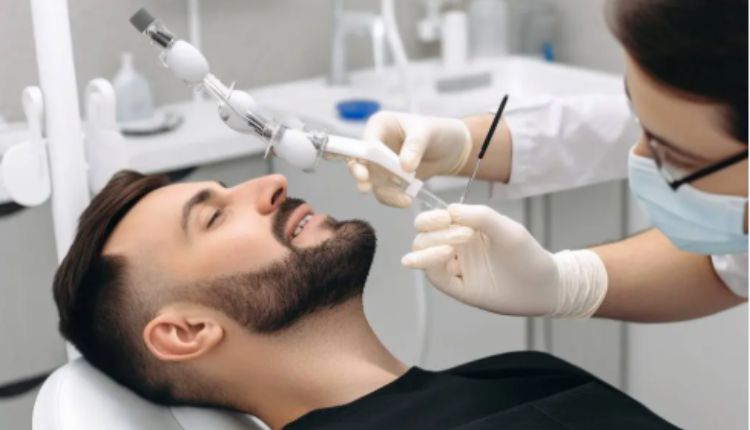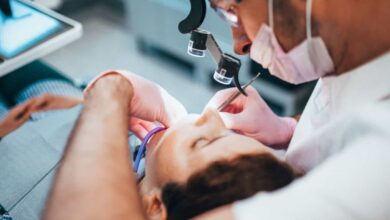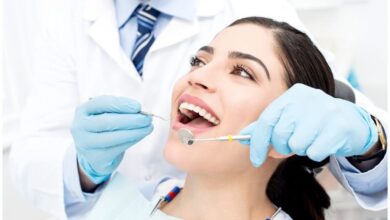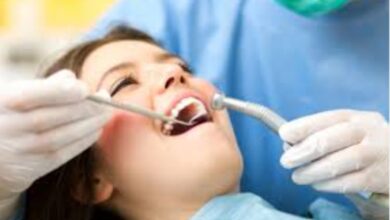Understanding Emergency Dentistry Services

When a dental crisis hits, knowing where to turn is super important. Emergency dentistry services are there to help when you’ve got a serious problem that can’t wait for a regular appointment. It’s about getting you relief and preventing things from getting worse. Let’s take a look at what these services involve.
Types of Dental Emergencies
So, what counts as a dental emergency? It’s more than just a little toothache. Here are some situations where you should seek immediate care:
- Severe Toothache: Pain that’s unbearable and doesn’t go away with over-the-counter meds.
- Knocked-Out Tooth: Time is of the essence to try and save the tooth.
- Broken or Cracked Tooth: Especially if it’s causing pain or has sharp edges.
- Abscess: A painful infection that can spread if not treated.
- Excessive Bleeding: Bleeding in the mouth that won’t stop.
Common Procedures Offered
Emergency dentists offer a range of procedures to address different issues. Here are a few common ones:
- Pain Relief: This could involve medication or procedures to alleviate pain.
- Tooth Replantation: Attempting to reinsert a knocked-out tooth.
- Abscess Drainage: Draining an infection to relieve pressure and prevent spread.
- Fracture Stabilization: Stabilizing broken or cracked teeth.
- Emergency Extractions: Removing a tooth when it can’t be saved.
When to Seek Immediate Care
Knowing when to head to an emergency dentist can save you a lot of trouble. Don’t delay if you experience any of these:
- Uncontrolled Bleeding: Bleeding that doesn’t stop after applying pressure for a reasonable time.
- Facial Swelling: Swelling that could indicate a serious infection.
- Trauma to the Mouth: Injuries from accidents or falls.
- Difficulty Breathing or Swallowing: This could be related to an infection and needs immediate attention.
- Severe Pain: Pain that’s debilitating and not manageable with home remedies.
Ignoring a dental problem can lead to bigger issues down the road. It can affect other teeth, your gums, and even the bone underneath. Knowing when to get emergency help can make a big difference in keeping things under control.
Finding Emergency Dentists in Chicago
So, you’ve got a dental emergency and need to find an emergency dentist in Chicago IL, stat. Don’t panic! Finding the right help quickly is key. Here’s how to track down reliable emergency dental care in the Windy City.
Local Emergency Dental Clinics
Okay, first things first, let’s talk about local clinics. These places are usually your best bet for immediate attention. Here’s what to look for:
- Extended Hours: Many emergency dental clinics offer evening and weekend appointments, which is super helpful when your regular dentist’s office is closed.
- Same-Day Appointments: The best clinics will try to get you in on the same day you call, especially if you’re in serious pain.
- Comprehensive Services: Make sure the clinic can handle a range of emergencies, from toothaches to broken teeth. Some even offer cosmetic dentistry chicago and full mouth dental implants chicago if needed after the emergency is resolved.
Online Resources for Emergency Dentists
If you’re not sure where to start, the internet is your friend. But be careful – not all online resources are created equal. Here’s how to use them effectively:
- Dental Association Websites: The American Dental Association (ADA) website often has a tool to find local dentists. Look for ones that specifically mention emergency services.
- Review Sites: Check out Yelp, Google Reviews, and similar sites to see what other patients say about their experiences. Pay attention to comments about wait times, pain management, and overall quality of care.
- Clinic Websites: Once you’ve found a few potential clinics, visit their websites to learn more about their services, hours, and accepted insurance plans. Some may even specialize in dental implants chicago.
Recommendations from Friends and Family
Word of mouth can be super valuable. Ask around – chances are, someone you know has had a dental emergency and can recommend a good dentist in Chicago IL.
- Personal Experiences: Hearing about someone’s direct experience can give you a better sense of what to expect.
- Specific Needs: Let your friends and family know what kind of emergency you’re dealing with. They might have recommendations for dentists who specialize in that area.
- Trustworthy Referrals: You’re more likely to trust a recommendation from someone you know and trust.
Finding the right emergency dentist can feel overwhelming, but with a little research and some smart strategies, you can get the care you need quickly and effectively. Don’t hesitate to call around, ask questions, and advocate for yourself. Your oral health is worth it, especially when dealing with emergency dentistry chicago.
What to Expect During an Emergency Visit
So, you’ve got a dental emergency and you’re heading to the dentist. What happens next? It’s natural to feel a little anxious, but knowing what to expect can really help ease your mind. Emergency dentistry is all about addressing immediate problems to relieve pain and prevent further complications. Here’s a breakdown of what usually goes down during an emergency visit.
Initial Consultation Process
First things first, the dentist will want to figure out what’s going on. This usually involves:
- A Quick Chat: They’ll ask you about your symptoms, when they started, and your medical history. Be as detailed as possible.
- Exam Time: The dentist will take a look at your mouth, focusing on the area that’s bothering you. They might poke around a bit to see what’s causing the pain.
- X-rays (Maybe): Depending on the situation, they might need to take an X-ray to get a better view of what’s happening beneath the surface. This is super common if you’re dealing with a toothache or trauma.
Common Treatments and Procedures
Okay, so they’ve figured out the problem. Now what? Here are some common things they might do:
- Pain Relief: This is usually the first priority. They might give you a local anesthetic to numb the area before doing anything else.
- Repair Work: If you’ve got a broken or chipped tooth, they might be able to fix it with a filling or bonding. For more serious damage, a crown might be needed.
- Extraction: Sometimes, a tooth is too damaged to save and needs to be pulled. It’s not ideal, but it can be the best option for your overall health.
- Incision and Drainage: If you have an abscess (a pocket of infection), they’ll need to drain it to get rid of the infection.
Post-Treatment Care and Follow-Up
After the emergency treatment, it’s important to take care of yourself to make sure everything heals properly. Here’s what to expect:
- Instructions, Instructions, Instructions: The dentist will give you specific instructions on how to care for the treated area. Follow them carefully!
- Pain Management: They might prescribe pain medication to help with any discomfort. Over-the-counter pain relievers can also work.
- Follow-Up Appointment: You’ll probably need to come back for a follow-up appointment to make sure everything is healing correctly and to discuss any further treatment that might be needed.
Remember, even after the emergency is over, it’s important to schedule a regular dental check-up. Emergency care addresses the immediate problem, but regular check-ups help prevent future issues and keep your mouth healthy in the long run. Think of it like patching a tire – you need to fix the hole, but you also need to make sure the tire is in good shape overall.
Preventing Dental Emergencies
Nobody wants a dental emergency. They’re painful, inconvenient, and can be expensive. The good news is that many dental emergencies are preventable with the right habits and precautions. Let’s talk about how to keep your smile healthy and avoid those unexpected trips to the emergency dentist.
Regular Dental Check-Ups
Think of your regular dental check-ups as preventative maintenance for your mouth. It’s like taking your car in for an oil change – it helps catch small problems before they turn into big ones. Here’s why they’re so important:
- Early Detection: Dentists can spot early signs of decay, gum disease, and other issues that you might not even notice.
- Professional Cleaning: Regular cleanings remove plaque and tartar buildup, which can lead to cavities and gum problems.
- Personalized Advice: Your dentist can give you specific recommendations for your oral health based on your individual needs.
Oral Hygiene Practices
Your daily oral hygiene routine is your first line of defense against dental problems. It’s not just about brushing; it’s about doing it right and consistently. Here’s a breakdown:
- Brushing: Brush at least twice a day for two minutes each time, using fluoride toothpaste. Make sure you’re using the right technique to clean all surfaces of your teeth.
- Flossing: Floss daily to remove plaque and food particles from between your teeth, where your toothbrush can’t reach. Don’t skip this step!
- Mouthwash: Using an antiseptic mouthwash can help kill bacteria and freshen your breath. It’s a good addition to your routine, but it’s not a substitute for brushing and flossing.
Protective Gear for Sports
If you play sports, especially contact sports, wearing a mouthguard is a must. It’s a simple way to protect your teeth from serious injuries. Here’s what you need to know:
- Custom-Fitted Mouthguards: These offer the best protection because they’re made specifically for your mouth. Your dentist can create one for you.
- Boil-and-Bite Mouthguards: These are a more affordable option that you can mold to your teeth at home. They offer decent protection, but not as good as custom-fitted ones.
- Stock Mouthguards: These are the least expensive option, but they don’t offer much protection because they don’t fit well. It’s better than nothing, but not by much.
Taking these preventative measures can significantly reduce your risk of needing emergency dental care. It’s all about being proactive and taking care of your teeth before problems arise. A little effort now can save you a lot of pain and expense later.
Emergency Dentistry vs. General Dentistry
It’s easy to confuse emergency dentistry with general dentistry, but they serve different purposes. Think of it this way: general dentistry is like your family doctor, while emergency dentistry is like the urgent care center for your teeth. Knowing the difference can save you time, money, and a whole lot of pain.
Differences in Services Provided
General dentists focus on preventative care and long-term oral health. They handle routine check-ups, cleanings, fillings, and crowns. Emergency dentists, on the other hand, deal with immediate and often unexpected dental problems. Here’s a quick breakdown:
- General Dentistry:
- Regular check-ups and cleanings
- Fillings and root canals (non-emergency)
- Crowns and bridges
- Teeth whitening
- Emergency Dentistry:
- Severe toothaches
- Broken or knocked-out teeth
- Abscesses and infections
- Uncontrollable bleeding
When to Choose Emergency Care
Knowing when to seek emergency dental care is important. If you’re experiencing severe pain, uncontrolled bleeding, or have suffered a traumatic injury to your mouth, it’s time to call an emergency dentist. Don’t wait for your regular dentist’s office to open if you’re in serious discomfort or at risk of losing a tooth.
Basically, if it feels like a crisis, it probably is. A good rule of thumb is to consider whether the issue can wait a few days or if it needs immediate attention to prevent further damage or alleviate severe pain.
Cost Considerations
Emergency dental care often comes with a higher price tag than general dentistry. This is because emergency dentists are available outside of regular business hours and need to be prepared for a wide range of urgent situations. However, delaying treatment for a dental emergency can lead to more extensive and costly procedures down the road. It’s a balance between immediate cost and long-term oral health. Always check with your insurance provider to understand your coverage for emergency dental services.
Emergency Dental Care for Specific Issues
When you’re facing a dental crisis, knowing how to handle specific problems can make a huge difference. It’s not always clear what constitutes an emergency, but understanding the immediate steps can help save a tooth or prevent further complications. Let’s look at some common issues that might require emergency dental attention.
Toothaches and Pain Management
Toothaches can range from mildly annoying to completely debilitating. If you’ve got a toothache that just won’t quit, it could signal a more serious problem. Here’s what you can do:
- Rinse your mouth with warm salt water. This can help dislodge any food particles and reduce inflammation.
- Take an over-the-counter pain reliever. Ibuprofen or acetaminophen can help manage the pain temporarily.
- Apply a cold compress to the outside of your cheek. This can help numb the area and reduce swelling.
If your toothache is severe, persistent, or accompanied by fever, swelling, or difficulty breathing, seek immediate dental care. These symptoms could indicate a serious infection that needs prompt treatment.
Dealing with Broken or Chipped Teeth
A broken or chipped tooth can be alarming, but quick action can improve the chances of saving the tooth or minimizing damage. Here’s what to do:
- Rinse your mouth with warm water.
- If there’s bleeding, apply pressure to the area with a clean cloth.
- Try to find and save any broken pieces of the tooth. Your dentist might be able to reattach them.
- Cover the broken part of the tooth with temporary dental cement (available at drugstores) or sugar-free gum to protect it.
Handling Knocked-Out Teeth
A knocked-out tooth is a serious dental emergency that requires immediate attention. The sooner you act, the better the chance of saving the tooth. Here’s what to do:
- Handle the tooth carefully, holding it by the crown (the part that’s usually visible).
- Gently rinse the tooth with water, but don’t scrub it or remove any tissue fragments.
- Try to reinsert the tooth into its socket. If it goes in easily, hold it in place by gently biting down on a clean cloth.
- If you can’t reinsert the tooth, place it in a container of milk or saliva. This will help keep the tooth moist and viable.
- Get to an emergency dentist as quickly as possible. Time is of the essence when it comes to saving a knocked-out tooth.
Insurance and Payment Options for Emergency Care
Let’s be real, a dental emergency is stressful enough without worrying about how you’re going to pay for it. This section is all about understanding your insurance and payment options so you can focus on getting the care you need.
Understanding Coverage for Emergency Services
First things first, you need to figure out what your dental insurance actually covers. It’s not always straightforward. Here’s what to look into:
- Check your policy: Seriously, dig out that booklet (or log into your online account) and read the fine print. Look for specifics on emergency dental care.
- In-network vs. out-of-network: Does your insurance have a list of dentists you need to see to get the best coverage? Emergency situations don’t always allow for that luxury, so find out how your plan handles out-of-network care.
- Annual maximums and deductibles: Know how much your insurance will pay in a year and how much you need to pay out-of-pocket before coverage kicks in. This can make a big difference in your final bill.
Payment Plans and Financing Options
Okay, so maybe your insurance doesn’t cover as much as you’d hoped, or maybe you don’t have insurance at all. Don’t panic! Many dental offices offer ways to make emergency care more affordable:
- Payment plans: Some dentists will let you spread out your payments over a few months. It’s worth asking if they have this option.
- Financing: Companies like CareCredit specialize in healthcare financing. You can apply for a line of credit to cover your dental expenses and then pay it back over time.
- Discounts: It never hurts to ask if the office offers any discounts, especially if you’re paying cash.
Finding Affordable Emergency Dentists
Finding an emergency dentist that fits your budget is important. Here are some things to consider:
- Call around: Don’t just go to the first dentist you find. Get quotes from a few different places to compare prices.
- Community clinics: These clinics often offer lower-cost dental care. They might be a good option if you’re on a tight budget.
- Dental schools: Dental schools often have clinics where students provide care under the supervision of experienced dentists. The cost is usually lower than private practices.
Dealing with a dental emergency is tough, but don’t let financial worries stop you from getting the treatment you need. Explore all your options, talk to the dental office, and find a solution that works for you. Your oral health is worth it!




